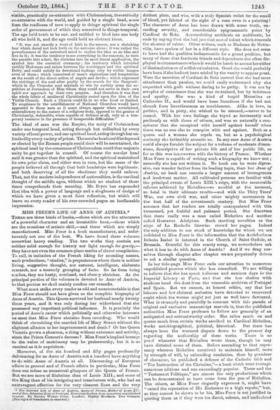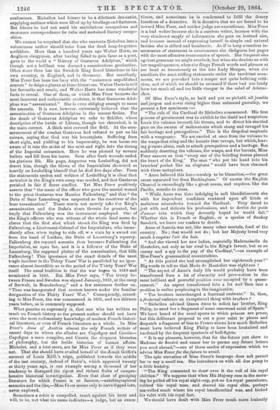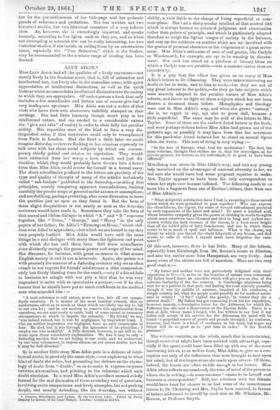MISS FREER'S LIFE OF ANNE OF AUSTRIA.* MERE are three
kinds of books,—those which are the utterances of a powerful character and an irresistible ben t,—those which
are the creations of artistic skill,—and those which are simply manufactured. Miss Freer is a book manufacturer, and unfor- tunately not one of the best. We have found these volumes somewhat heavy reading. The two works they contain are neither solid enough for history nor light enough.for gossip,— they have not even the common-place merits of clever compilation. To call, in imitation of the French liking for sounding names, such productions, "studies," is preposterous where there is neither living, suggestive thought, nor earnest, intelligent, elaborate research, nor a masterly grouping of facts. So far from being Kudies, they are hasty, confused, and clumsy sketches. As the principal portion of the volumes is devoted to Anne of Austria, to that portion we shall mainly confine our remarks.
What must strike every reader as odd and unaccountable is that Miss Freer should not have given us the complete biography of Anne of Austria. This Queen survived her husband nearly twenty three years, and it was only during her widowhood that she possessed any important political influence. It is precisely the period of Anne's career which politically and otherwise interests us most that Miss Freer abstains from recording. Who would think of chronicling the married life of Mary Stuart without the slightest allusion to her imprisonment and death ? Or has Queen Victoria grown a phantom, a thing without existence and activity, since the Prince Consort's decease? Miss Freer's implied homage to the value of matrimony may be praiseworthy, but it is as comical as it is capricious.
Moreover, of the six hundred and fifty pages professedly delineating for us Anne of Austria not a hundred have anything to do with Anne of Austria at all. Discoursing of European affairs in general and of French affairs in particular, Miss Freer does not refuse us occasional glimpses of the Queen of France. But we see more of Richelieu than of Louis XIII., and more of the King than of his intriguing and treacherous wife, who had an extravagant affection for the very cleanest linen and the very
• The Married Ltfe of Anne of Austria, Qieeen of France, Mother of Louis XIV. and of Don, Sebastian King of Portugal. Historical Studies, from numerous unpublished hourees. By Martha Walker Freer. London : Tinsley Brothers. Two volumes. (The right of translation is reserved.)
dirtiest plots, and who, with a truly Spanish relish for the smell of blood, yet fainted at the sight of a rose even in a painting! The character of Anne has been drawn with some truth, ex- ceeding severity, and considerable epigrammatic point by Cardinal de Retz. Accumulating antithesis on antithesis, he ends by saying that she had just that sort of talent which conceals the absence of talent. Other writers, such as Madame de :Vette- vine, have spoken of her in a different style. She does not seem to have had the qualities indispensable for a grand position, but many of those that fascinate friends and dependents she often dis- played in circumatanceswhere it would be harsh to accuse her either of' dissimulation or of selfish calculation. Good she would probably have been if she had not been misled by the vanity to appear great. Were the assertion of Cardinal de Retz correct that she had more attachment than passion, we could easily understand why she coquetted with guilt without daring to be guilty. It was not by scruples of consciencelliat she was restrained, but by indolence and apathy. She was a kind of torpid Messalina or Catherine II., and would have been licentious if she had not shrunk from licentiousness as troublesome. Alike in love, in politics, and in piety, she wished to be amused,—never to be roused. With her own feelings she toyed as incessantly and perilously as with those of others, and was so naturally a con- spirator that she conspired with herself against herself when there was no one else to conspire with and against. Both as a queen and a woman she repels us, but as a psychological curiosity she invincibly attracts us. In any case Anne of Austria could always furnish the subject for a volume of moderate dimen- sions, 'descriptive of her private life and of her public life, so far as this was interwoven with the history of France. Whether Miss Freer is capable of writing such a biography we know not ; assuredly she has not written it. No book can be more digres- sive, can wander farther from its leading topic, than her Anne of Austria, no book can contain a larger amount of incongruous and irrelevant matter. All cultivated persons are familiar with the principal events of Louis XIII.'s reign, with the memorable reforms achieved by Richelieu—so needful at the moment, so fatal in their ultimate results—and with the Thiry Years' War, our own civil war, and other mighty movements in the first half of the seventeenth century. But Miss Freer assumes that her readers are totally unacquainted with this tormented, yet fruitful and puissant period. She discovers that there really was a man called Riohelieu and another called Gustavus Adolphus. Such startling novelties as the siege of La .Rochelle likewise crowd her pages. Indeed the only addition to our stock of knowledge for which we are indebted to Miss Freer is the information that the Archduchess Infanta Isabel is interred in the Church of Saint Gudule, at. Brussels. Grateful for this scanty scrap, we nevertheless ask what it has to do with Anne of Austria? And if we drag our- selves through chapter after chapter we are perpetually driven to ask a similar question.
In her tide-page Miss Freer calls our attention to numerous unpublished Liources which she has consulted. We are willing to believe that she has spent toilsome and anxious days in the Imperial Library at Paris, and that she has shaken with studious hand the dust from the venerable archives of Portugal and Spain. But we cannot, as honest critics, say that her labours and her cloistral seclusion have detected or recovered aught which the worms might not just as well have devoured. What is strangely and painfully in contrast with this parade of original and exclusive manuscript marvels is, that the published authorities Miss Freer professes to follow are generally of an antiquated and untrustworthy order. She relies much on and quotes much from certain works ascribed to Cardinal Richelieu, works autobiographical, political, historical. But there has always been the warmest dispute down to the present day regarding the authorship of these works. There is no proof whatever that Richelieu wrote them, though lie may have dictated some of them. Before ascending to that supre- macy whereon Richelieu contrived to maintain himself, more by strength of will, by unbending resolution, than by grandeur of character, he published a defence of the Catholic faith and "The Instruction of the Christian,"— a book which went through numerous editions and was exceedingly popular. These and the "Testament Politique," are almost the only productions which can be demonstrated to have come from the pen of Riehelieu. The others, as Miss Freer elegantly expresses it, might have "raised the reputation of His Eminence to a high repute," but, as they cannot be shown to 'hehie, Miss Freer is not justified in quoting them as if they were his direct, solemn, and undoubted
confessions. Richelieu had leisure to be a dilettante dramatist, supplying outlines which were filled up by hirelings and flatterers.
But leisure he had not amid his multifarious occupations and enormous correspondence for calm and sustained literary compo- sition.
We cannot be surprised that she who converts Richelieu into a voluminous author should raise from the dead long-forgotten scribblers. More than a hundred years ago Walter Harte, an Anglican clergyman, after having failed to gain fame as a poet,
gave to the world a " History of Gustavus Adolphus," which though not a brilliant was deemed a conscientious production. Often since then has the Swedish King found historians in his own country, in England, and in Germany. But manifestly
Miss Freer has been too busy with the "numerous unpublished sources" to deign a glance at these historians. Walter Harte is still her favourite and oracle, and Walter Harte has some wonderful facts to reveal. One of them, on which Miss Freer bestows the most innocent and enthusiastic credence, is that Gustavus Adol-
phus was "assassinated." She is even obliging enough to name
the assassin. It is now, however, universally believed that the assassination of Gustavus Adolphus is the merest fiction. For
the death of Gustavus Adolphus we refer to Schiller, whose description of the battle of Liltzen, though too rhetorical, is in the main correct. A thick mist covered the field. At the com- mencement of the combat Gustavus had refused to put on his cuirass, saying that God was his breastplate. Suffering from short sight, and yielding to his impetuosity, he was borne ere aware of it into the midst of the mist and right into the throng of the Imperial cuirassiers. Here he was pierced by several bullets and fell from his horse. Soon after fresh wounds ended his glorious life. His page, Augustus von Leubelfiug, did not desert him, though the blows of the Imperialists showered so heavily on Leubelfing himself that he died five days after. From the statements spoken and written of Leubelfing it is clear that no traitor in the King's own camp was needed, and that, Gustavus perished in fair if fierce conflict. Yet Miss Freer positively asserts that" the name of the officer who gave the mortal wound to the great Gustavus was Maurice Falkenberg," and that "the Duke of Saxe Lauenburg was suspected as the contriver of the base assassination? These words not merely take the King's assassination and the Duke's share therein for granted, but imply that Falkenberg was the instrument employed. One of the King's officers who was witness of the whole fatal scene de- clares that the first shot which struck the King was fired by Falkenberg, a Lieutenant-Colonel of the Imperialists, who imme- diately after, when trying to ride off, w.,s slain by a sword cut from the hand of Luckau,- the Duke of Lauenburg's equerry. Falkenberg the reputed assassin thus becomes Falkenberg the Imperialist, an open foe, and it is a follower of the Duke of Lauenburg,lhe supposed plotter of the assassination, that kills Falkenberg ! This ignorance of the exact details of the most tragic incident in the Thirty Years' War is paralleled by an igno- rance almost incredible as to the period of the Thirty Years' War itself. The usual tradition is that,' the war began in 1618 and terminated in 1648. But Miss Freer says, "Time treaty be- tween France and Sweden was signed January, 1631, at the camp of Berwalt, in Brandenburg," and a few sentences further on, "Thus was inaugurated that contest known under the familiar designation of the Thirty Years' War." Consequently, accord- ing to Miss Freer, the war commenced in 1631, and not thirteen years before, as is commonly supposed.
What puzzles us supremely is, that one who has written so much on French history as the present author should not have even the most rudimentary knowledge of modern French histori- cal literature, or even of French literature as a whole. , In Miss Freer's Anne of Austria almost the only French writers of recent days to whom she alludes are Capefigue and Cousin- Capefigue a mere compiler, and Cousin the eloquent historian of philosophy, but the feeble historian of human affairs. Michelet, and a host more, are for Miss Freer as if they were not. That she should have availed herself of the Jesuit Griffet's account of Louis XIII.'s reign, published towards the middle' of the last century, instead of Bazin's, which appeared twenty or thirty years ago, is one example among a thousand of her tendency to disregard the ripest and richest fruits of compre- hensive historical investigation. Even that class of gossiping literature for which France is £0 famous,—autobiographical memoirs and the like,—Miss Freer seems only to have dipped into, never explored.
Sometimes a critic is compelled, much against his taste and will, to be, not what his name indicates—a judge, but an execu-
tioner, and sometimes he is condemned to fulfil the dreary functions of a detective. It is detective that we are forced to be toward Miss Freer, and neither jedge nor executioner. Miss Freer is a bad writer because she is a careless writer, because with the very slenderest supply of information she puts on learned airs, and because instead of expressing herself in simple and natural fashion she is stilted and bombastic. As if to keep countless in- accuracies of statement in countenance she disfigures her pages with the most offensive inaccuracies of speech. Her frequent sins against grammar we might overlook, but when she deafens us with her magniloquences, when she flings French words and phrases at our head as bounteously as the late Lady Morgan, when she smothers the most trifling statements under the tawdriest orna- ments, we are provoked into a temper not quite befitting criti- cism, and of which we should be ashamed if there had not lately been too much oil and too little vinegar in the salad of Aristar- chns.
Of Miss Freer's style, so bald and yet so piebald, all jumble and jargon and never rising higher than animated garrulity, we present a few specimens :— " The rule of the Cardinal de Richelieu commenced. His first process of government was to exhibit to the timid and suspicions Louis the volcano beneath his throne, and to direct his startled gaze on the swarm of malcontents which stung and ravaged his fair heritage and prerogatives." This is the dropsical emphatic with a vengeance. We are carried at once from the volcano to the wasps that sting and the locusts that ravage, but which, leav- ing parsons alone, rush to attack prerogatives and a heritage. But suddenly desertiug the volcano, the wasps, and the locusts, Miss Freer assures us that "every one of the bristling thorns pierced the heart of the King." The man "who put his hand into his breeches' pocket like an elephant ' would have bean charmed with these metaphors.
"Anne believed this hero-worship to be blameless,—the great ocean separated her from Buckingham." Of course the English Channel is exceedingly like a great ocean, and requires, like the Pacific, months to cross.
"While Anne was thus indulging in soft blandishments she with her imprudent confidant ventured upon all kinds of malicious minanderies toward the Cardinal. They dared to jest with and. ridicule his professions, and to devise des pats &amour into which they devoutly hoped he would fall." Whether this is French or English, or a species of flunkey Sanskrit, we leave our readers to decide.
Anne of Austria was not, like many other mortals, fond of the country. No ; that would not do ; but her Majesty loved very much a respirer rair des bole.
"And she viewed her new ladies, especially Mademoiselle de Hautefort, not only as her rival in the King's favour, but as an enemy and a aft in the pay of the Cardinal,"--an example of Miss Freer's grammatical eccentricities.
At this period she had accomplished her eighteenth year?" Big words to tell us that Marie de Hautefort was eighteen !
"The asrect of Anne's daily life would probably have been transformed from a lot of obscurity and persecution to the most brilliant and powerful position ever occupied by a queen- consort." An aspect transformed into a lot and 'then into a position is rather perplexing to the imagination.
"The brothers interchanged a fraternal embrace." Is, then, a fraternal embrace an exceptional thing with brothers ?
"Richelieu advised Queen Anne to solicit her brother, King Philip, to send her a fragment of some renowned saint of Spain." We have heard of the cruel sports to which princes are prone, but this deliberate proposal to cut a poor saint to pieces and despatch a fragment of him to France shows how much Richelieu must have believed King Philip to have been brutalized and hardened by the frequent spectacle of bull-fights.
"It is my pleasure, however, that for the future you show to Madame de Sonece and cause her to peruse any future letters you send abroad,"—one of those modes of expression which we advise Miss Freer for the future to avoid.
'The epic elevation of Miss Freer's language does mit permit her to say a small inn. She introduces us with all due pomp to a little hostelry.
"The King consented to draw over it the veil of his royal oblivion." We suppose that when His Majesty rose in the morn- ing he pulled off his royal night-cap, put on his royal pantaloons, rubbed his royal nose, and shaved his royal chin, perhaps marvelled much where his royal handkerchief was, and kicked his valet with his royal foot.
We should have dealt with Miss Freer much more leniently but for the pre:entiousness of her title-page and her pedantic parade of referenccs and quotations. She has written not two historical studiea, but two historical romances of a very inferior class. As, however, she is exceedingly impartial, and speaks honestly, according to her lights, such as they are, and as when not attempting to astonish she can be really interesting, her two historical studies, if she insists on calling them by an ostentatious name, especially the "Don Sebastian," which is the fresher, may be recommended to those whose range of reading has been limited.




































 Previous page
Previous page